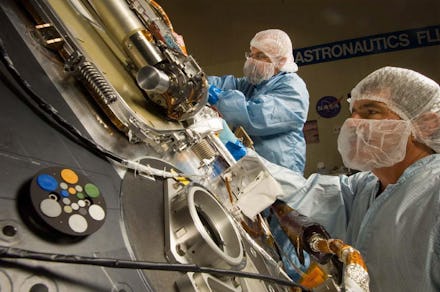Apply to be NASA’s planetary protection officer and save us from an alien invasion

If you have a knack for thinking on your feet in complicated situations and a degree in physical sciences, dust off your resume for one of the coolest jobs on Earth: NASA’s Planetary Protection Officer.
The application period closes on Aug. 14 and promises a six-figure salary, for an initial three-year appointment, although that could be extended if your tenure goes well. Additional requirements include a working knowledge of planetary protection and a willingness to travel.
But don’t expect that travel to be off the planet — this officer fights their battles closer to home.
Here’s how NASA describes the mission of its Planetary Protection Office: “to promote the responsible exploration of the solar system by implementing and developing efforts that protect the science, explored environments and Earth.” They have a catchy slogan, too: “All of the planets, all of the time.”
That’s not just a nice scientific precaution to make sure no one mistakes hitchhikers from Earth for life on Mars — it’s actually required by an international treaty the U.S. signed in 1967 that governs how we and 104 other countries behave in space. The treaty, like a roommate agreement, basically says that outer space belongs to everyone, so no one is allowed to leave a mess there. And in the very same article, it reminds us not to let our explorations contaminate the planet we still very much rely on for life.
The Planetary Protection Officer and the rest of the team approach their responsibilities from a few different directions. One piece is to make sure the spacecraft NASA builds aren’t carrying any bacteria that could sneak off to colonize another planet — that’s why spacecraft are built in clean rooms, giant spaces that filter out contaminants.
Another task is to make sure flight plans don’t put the places where we think life might exist in the first place at risk. That’s why NASA has taken to dramatically crashing its spacecraft at the end of missions like Cassini, which will plummet into Saturn in September, and Juno, which will meet a similar fate in Jupiter. The spacecraft will burn up in the gas giants’ atmospheres, protecting those of their moons that scientists think may be able to support life, like Europa, Enceladus and Titan.
The third prong, of course, is to keep Earth itself safe, but surprisingly, that takes up less of the office’s time.
And if you’re interested in the job but not qualified this time around, NASA also offers planetary protection training courses once every year.